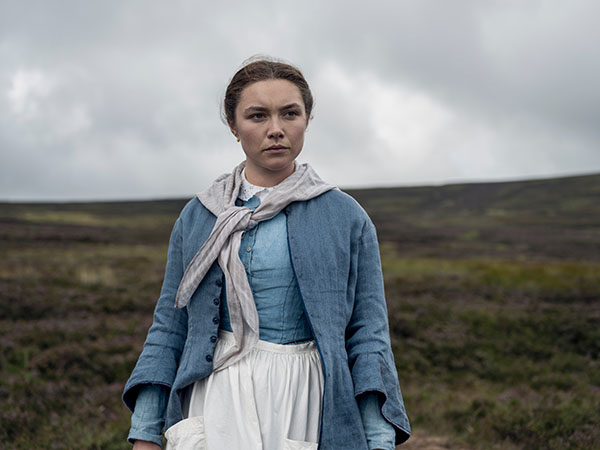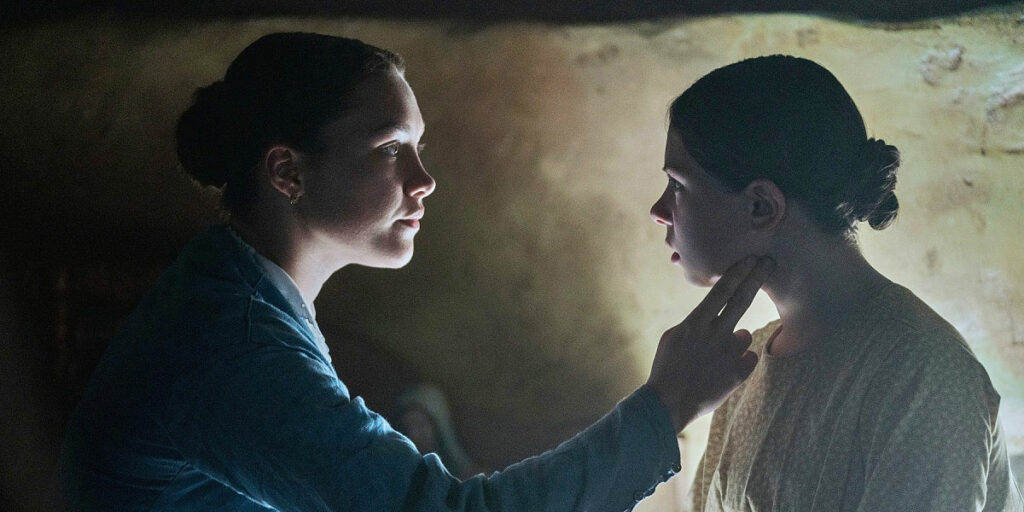Although it lacks thematic heft, The Wonder is elevated by Ari Wegner’s cinematography and strong performances by Florence Pugh and Kila Lord Cassidy.
Sebastián Lelio is a fascinating filmmaker that I have enjoyed seeing grow. Even though his last film, the English-language remake of his own movie, Gloria (2013), wasn’t up to par with the rest of his catalog, there were glimpses of acute precision in his directorial vision and hand. The first markings of his potential were seen in his two 2017 features, A Fantastic Woman and Disobedience, but his gift has been kept on hold during these last four years as he prepared to deliver his next project. This year, 2022, marks the return of several filmmakers, Lelio included. Some of these returns have been worth the wait, like Park Chan-wook’s Decision to Leave and David Cronenberg’s Crimes of the Future (which I think is one of the best films of the year). Nonetheless, with the good comes bad; some features haven’t lived up to the hype or were lackluster.
Unfortunately, Lelio’s latest – the Florence Pugh-led adaptation of Emma Donoghue’s “The Wonder” – falls onto his latter situation, even if glances of cinematic brilliance are scattered across its 100-minute runtime. The Wonder begins with an odd introduction that surprises the audience because of its unexpected and directorial creativity. The movie opens on a soundstage, with a narrator talking about the importance of stories and the impact of belief amidst these so-called “tall tales”. She proceeds to invite us on a journey that centers on conviction and faith – cinematic and miracle-wise – and on our need to believe in the story that will be told during the following two hours. Is this setup a gimmick, like the one the lead character will be searching for, or is it something that will express how cinematic magistery is made through simple effects? It’s actually both. The Wonder doesn’t rigorously gain much from this self-conscious setup but intertwines it with its themes of belief amidst possible deceit.
The film is set in the Irish Midlands in 1859, where an English nurse, Lib Wright (the consistently remarkable Florence Pugh), is hired by some elders to observe, take notes, and care for an uncanny girl, Anna O’Donnell (Kíla Lord Cassidy), in a tiny village, alongside a nun. Its setting is haunted and covered in dread because of the shadows caused by the Great Famine, but there is a potential ray of light that might brighten the souls of those who have lost something or are seeking a new beginning. Unfortunately, Lelio doesn’t capture the importance of food quite well, or how the people value it since there isn’t much to pass around. You can sense it through the performances, especially on the occasions when Lib is called upon and has to put her meal aside, but that doesn’t stand out in the atmosphere. The girl is called a “miracle child” because of a medical anomaly. She has survived without food for months, and there are no signs of illness: she’s as healthy as she can be.

Locals view this event as a blessing – a godsend oddity bound to be fruitful. Anna’s potential divinity enamors her mother (Elaine Cassidy). In contrast, others want to test their own theories against such beliefs, especially a local doctor (Toby Jones) and a way-too-friendly journalist (Tom Burke). There is a lot of questioning regarding its validity amongst those who rely on science more so than faith. That’s where Lib comes into play, chronicling the reality of the so-called “gift”. Lelio’s past work revolved around women’s troubles during moments of grief or longing. With his latest, he takes another route to tell a story of hope – the yearning for a blessing that could help the people escape their harsh realities. It is about the dangers of faith and the credibility of anomalies or miracles, depending on the eyes which perceive it. In my opinion, films that examine the infrastructure of how faith works are richly engaging, as one may even think about their own as soon as the credits roll.
One could either choose to believe in the possible presence of godsend blessings or make it have sense regarding scientific fact or probability. Yet, that is what this film has at its core: the various interpretations of an uncanny event by the people sensing it. The act of belief has a strong presence since it occurs in a world of deception and tragedy – a town marked by a cataclysm that hasn’t yet begun to acclaim itself to the current situations. Religion often blinds people from the truth, but believers have tranquility of their own because they can express their anxieties to a higher power. All of this is what drove me to the film, outside of its talented cast and crew. There’s much to play with regarding those themes, and with a director like Sebastián Lelio at the helm, one would expect some boldness in his filmmaking. From the first instance, Lelio wants you to believe in the story being told and how it is being presented. You begin to be entranced by the gloomy melancholy of the Irish Midlands as Ari Wegner’s rampant cinematography captures the essence of a ray of light amidst darkness caused by a clinging past.
As Lelio continues to tell the story of the young nurse dealing with anomalies and inner demons, you begin to notice that there isn’t much substance to a tale that was fascinating on paper. Since The Wonder doesn’t dwell much into its subject matter, you are left with a sensation of wanting more, aching for a deeper dive into the perils of conviction. The charming yet odd initial waverings of cinematic magic are lost entirely by the lack of thematic heft and focus, as well as a plot twist that isn’t much of one.
Nonetheless, there’s still much to be appreciated in The Wonder, even if its ideas are more half-baked rather than fully realized. In addition to Ari Wegner’s cinematography, the performances are what elevate and move the narrative forward. If one of Lelio’s talents stands out, it is his way of working with actors. You can always trust him to direct the cast to perfection. No scene in his movies will ever feel melodramatic. And if a small hair of melodrama makes its way onto the screen, it would feel nuanced.
In the highly deserved lead role, Florence Pugh is excellent, as always. You can’t deny her talents: with every role, she’s becoming one of the best actresses of our generation. Her performance is poised yet conflicting, doing a balancing act of ethical corruption in order to get to the truth and relatability due to the unpacking of her past. When Pugh shines, her co-star, newcomer Kíla Lord Cassidy, radiates just as much, or even more than her on several occasions. Her performance is vital to the film’s backbone because of the tension it brings, whether or not she has a gift. And Anna is fully committed to the act of possible devoutness. Still, there are moments where we see her inner suffering, both because of the pressure of being involved, likely gimmick or not living up to the people’s view of a miracle – there will be judgment coming from both sides.
By the time the film nears its end, you feel the need for a broader elaboration into its themes to reach a more precise form of closure, since what’s provided seems too miscalculated and slightly undeveloped. Nonetheless, I still see some growth from Sebastián Lelio here, even if The Wonder doesn’t live up to its potential. You end up believing in its story and trusting the man behind the camera, but the lack of development injures its viewing experience.
The Wonder premiered at TIFF on September 14, 2022, and will be released in US theaters on November 2 and on Netflix on November 16 in most countries and on December 7 in the UK. Read our list of films to watch at TIFF 2022.

